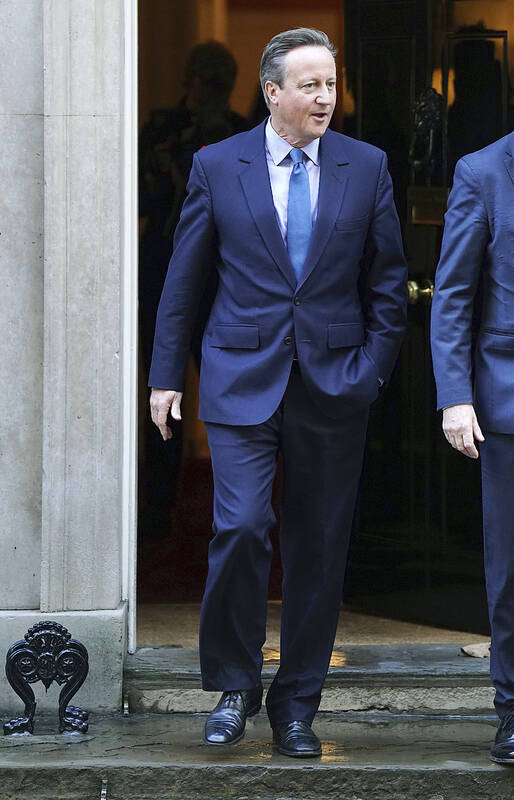Former British prime minister David Cameron yesterday made a shock return to high office, becoming foreign secretary in a major shakeup of the Conservative government that also saw the firing of divisive home secretary Suella Braverman.
Cameron, who led the UK government from 2010 to 2016, was appointed by British Prime Minister Rishi Sunak in a Cabinet shuffle in which he sacked Braverman, a divisive figure who drew anger for accusing police of being too lenient with pro-Palestinian protesters.
She was replaced by James Cleverly, who had been foreign secretary.

Photo: AP
Cameron’s appointment came as a surprise to seasoned politics watchers. It is rare for a non-lawmaker to take a senior government post, and it has been decades since a former prime minister held a Cabinet job.
The government said Cameron was being appointed to Parliament’s unelected upper chamber, the House of Lords.
Cameron, 57, said Britain was “facing a daunting set of international challenges, including the war in Ukraine and the crisis in the Middle East.”
“While I have been out of front-line politics for the last seven years, I hope that my experience — as Conservative leader for 11 years and prime minister for six — will assist me in helping the prime minister to meet these vital challenges,” he said in a statement.
Cameron’s appointment brings back to government a leader brought down by Britain’s decision to leave the EU. Cameron called the 2016 EU membership referendum, confident the country would vote to stay in the bloc. He resigned the day after voters opted to leave.
Sunak was a strong backer of the winning “leave” side in the referendum. Cameron’s return and Braverman’s sacking are likely to infuriate the Conservative Party’s right wing and inflame tensions in the party that Sunak has sought to soothe.
Prominent right-wing lawmaker Jacob Rees-Mogg said sacking Braverman was “a mistake, because Suella understood what the British voter thought and was trying to do something about it.”
Sunak had been under growing pressure to fire Braverman from one of the most senior jobs in government, responsible for handling immigration and policing.
Meanwhile, British environment secretary Therese Coffey resigned, saying in a letter to Sunak: “I consider it is now the right time to step back from government.”
In a letter responding to Coffey, Sunak thanked her for her “dedicated service.”
Additional reporting by Reuters

The CIA has a message for Chinese government officials worried about their place in Chinese President Xi Jinping’s (習近平) government: Come work with us. The agency released two Mandarin-language videos on social media on Thursday inviting disgruntled officials to contact the CIA. The recruitment videos posted on YouTube and X racked up more than 5 million views combined in their first day. The outreach comes as CIA Director John Ratcliffe has vowed to boost the agency’s use of intelligence from human sources and its focus on China, which has recently targeted US officials with its own espionage operations. The videos are “aimed at

STEADFAST FRIEND: The bills encourage increased Taiwan-US engagement and address China’s distortion of UN Resolution 2758 to isolate Taiwan internationally The Presidential Office yesterday thanked the US House of Representatives for unanimously passing two Taiwan-related bills highlighting its solid support for Taiwan’s democracy and global participation, and for deepening bilateral relations. One of the bills, the Taiwan Assurance Implementation Act, requires the US Department of State to periodically review its guidelines for engagement with Taiwan, and report to the US Congress on the guidelines and plans to lift self-imposed limitations on US-Taiwan engagement. The other bill is the Taiwan International Solidarity Act, which clarifies that UN Resolution 2758 does not address the issue of the representation of Taiwan or its people in

US Indo-Pacific Commander Admiral Samuel Paparo on Friday expressed concern over the rate at which China is diversifying its military exercises, the Financial Times (FT) reported on Saturday. “The rates of change on the depth and breadth of their exercises is the one non-linear effect that I’ve seen in the last year that wakes me up at night or keeps me up at night,” Paparo was quoted by FT as saying while attending the annual Sedona Forum at the McCain Institute in Arizona. Paparo also expressed concern over the speed with which China was expanding its military. While the US

SHIFT: Taiwan’s better-than-expected first-quarter GDP and signs of weakness in the US have driven global capital back to emerging markets, the central bank head said The central bank yesterday blamed market speculation for the steep rise in the local currency, and urged exporters and financial institutions to stay calm and stop panic sell-offs to avoid hurting their own profitability. The nation’s top monetary policymaker said that it would step in, if necessary, to maintain order and stability in the foreign exchange market. The remarks came as the NT dollar yesterday closed up NT$0.919 to NT$30.145 against the US dollar in Taipei trading, after rising as high as NT$29.59 in intraday trading. The local currency has surged 5.85 percent against the greenback over the past two sessions, central